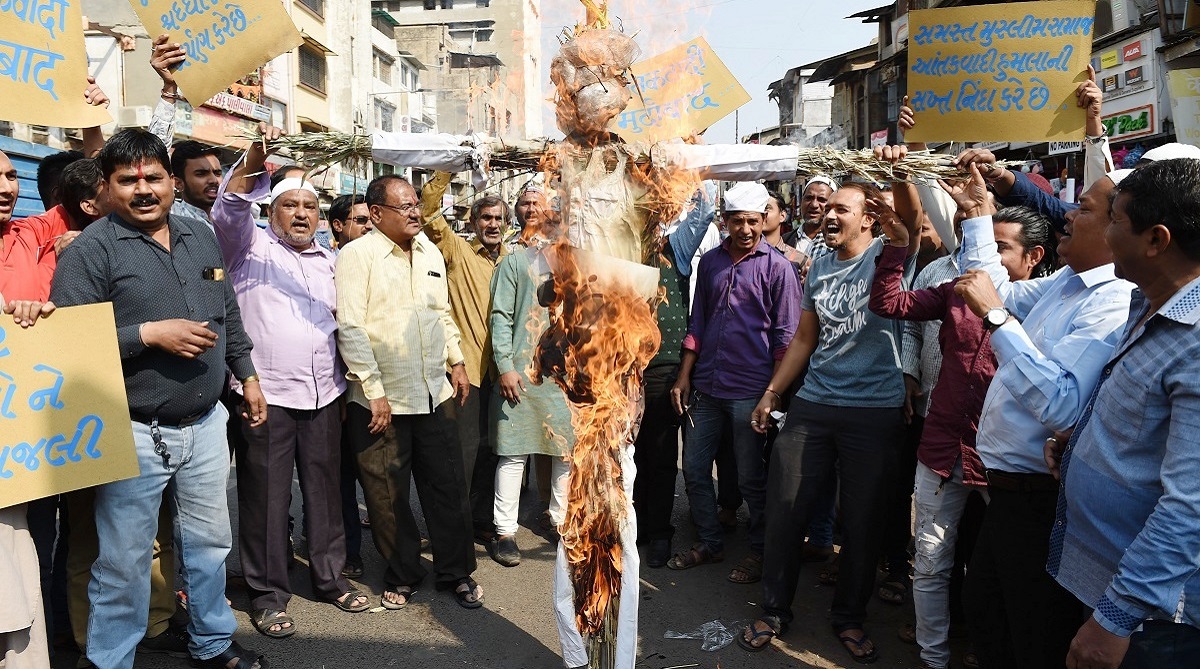Pakistan’s ANF arrests 10 suspects in drug smuggling operations
The Anti-Narcotics Force (ANF) of Pakistan arrested 10 individuals involved in drug smuggling in operations across the country, said a statement.
If the statement issued by the Revolutionary Guards is any indication, a vehicle loaded with explosives had targeted a bus carrying affiliated border guards.

Indian Hindu and Muslim shopkeepers shout slogans during a protest against terrorism outside the Shahi Jama Masjid in Ahmedabad on February 15, 2019, the day after an attack on a paramilitary Central Reserve Police Force (CRPF) convoy in the Lethpora area of Kashmir. At least 41 paramilitary troops were killed on February 14 as explosives packed in a van ripped through a convoy bringing 2,500 troopers back from leave not far from the main city Srinagar. (SAM PANTHAKY / AFP)
In a faint echo of the butchery in Pulwama, Iran bears witness to the relentless Shia-Sunni strife in the Muslim bloc. The two outrages are both the same and different; they have happened within a span of 24 hours in two different parts of Asia. For Iran, the enormity of the tragedy is reinforced not the least because it has befallen the country two days after the 40th anniversary of the Revolution that overthrew the Shah of Iran. As in Pulwama, it was a suicide bomber who perpetrated the attack on a bus carrying personnel of Iran’s Revolutionary Guards, an outrage that has killed 27 guards and wounded 20 others. We do not know whether ISIS was involved; yet we do know that Sunni extremists have claimed that they were behind the assault. The militants are linked to the Al Qaida in Pakistan; the fact that Pakistan’s ambassador in Tehran was summoned by the Rouhani government for a ‘verbal demarche’ lends credence to the general suspicion. So too was Pakistan’s man in Delhi summoned by the MEA as was the Indian High Commissioner in Islamabad. The short point being that from India to Iran, the diplomatic pressure has been ramped up on Pakistan. The attacks on the CRPF in Kashmir by the Jaish-e-Mohammad (JeM) and the Revolutionary Guards in Iran by the Sunnis signify a fundamentalist offensive against entities that are pivotal to security. This is the strand that binds Pulwama to Iran, specifically the province of Sistan-Baluchistan, a predominantly Sunni area which straddles the border with Pakistan. The attack was claimed by Jaish al-Adl, a jihadist group formed in 2012 as a successor to the Sunni extremist group Jundallah, which had waged a deadly insurgency against Iranian targets.
The suicide bombing happened on the day that a conference convened by the US in Warsaw was scheduled to discuss what Washington claims is Iran’s “malign influence” across the wider Middle East. Furthermore, it occurred two days after Iran marked the 40th anniversary of the Islamic Revolution and four decades of tense relations with the west. If the statement issued by the Revolutionary Guards is any indication, a vehicle loaded with explosives had targeted a bus carrying affiliated border guards. Iran’s foreign minister, Mohammad Javad Zarif, described the conference convened by the US as the “Warsaw Circus”, and said it was “no coincidence that Iran is hit by terror on the very day” that the talks began. “Especially when cohorts of the same terrorists cheer it from Warsaw and support it with twitter messages. The US always seems to make the same wrong choices, but expects different results.” From perceived nuclear proliferation to a terrorist outrage, the groundswell of Iranian opinion against the US has intensified.
Advertisement
Advertisement